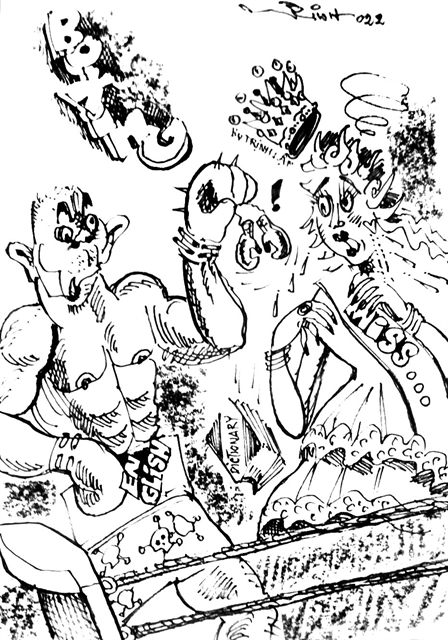 Talk Around Town
Talk Around Town

Lê Hương
The just-finished Miss Universe Vietnam 2022 was the first-ever national beauty contest to let finalist contestants speak in both Vietnamese and English at the live broadcast final round.
In this edition of Miss Universe Vietnam, the organisers introduced some obvious changes to the format.
From a short presentation round of the top 16 to a Q&A of the top 5 and top 3, contestants can choose to use both languages or just Vietnamese.
 |
Illustration by Trịnh Lập
In the top-16 round, three contestants did not choose English, while in the top 5, only Hoàng Phương spoke Vietnamese only.
The final top winner was Ngọc Châu, followed by Lê Thảo Nhi and Thủy Tiên, who are all able to speak English very well.
The use of English in such contests has sparked much debate for years, with some arguing it is necessary for contestants to speak English in a global environment and not rely on translators, with others seeing it as unneeded and even a form of xenomania.
Lê Ngọc Giàu, an audience member in HCM City, said she did not think it was necessary to let contestants speak anything other than their native tongue.
“That’s time-wasting and increasing pressure on contestants,” she said. “This is a beauty contest for Vietnamese people in Việt Nam. Why should they speak English on stage?”
Maybe those who did well in previous rounds lost points in this round as English was not their advantage.
Several contestants, including Nam Em and Hương Ly did not perform well in this part and were frowned on by netizens after the contest.
“I think the judges had various ways to test the English ability of contestants; for example, through daily conversations or private interviews,” Giàu said.
Lương Thế Hải, another audience member, disagreed with Giàu.
"The national contest aims to seek a worthy representative of Việt Nam in the global contest, so the winner must speak English well," he said.
Beauty expert Phúc Nguyễn, who often trains and coaches beauty queens for various international contests, strongly appreciated the new change. He held that this should be encouraged in national beauty contests.
“This time, the Miss Universe Vietnam contest pioneered to let finalists speak in both languages in front of a live audience of thousands. This is optional, and contestants are free to choose," he said.
However, Phúc was also quick to point out that laughing at someone’s English ability, aside from the contestants' beauty, was not acceptable.
“Standing on the stage in front of thousands of people, the pressure increases two or three-fold,” he said.
"The contestants choosing English are so brave. The audience can raise their voice, but please don’t judge or mock. At the beauty contests, we do not look for a master or bachelor in English. A beauty contest is not a contest in English. What challenges the contestants is their bravery to stand on stage and express their opinions
“Many people can speak well in daily life. But on stage, they lose their calm and get distracted. The final result comes from several rounds, including necessary and sufficient conditions, not just counting a few minutes speaking English on stage.”
Phúc said each beauty contest had particular criteria. The organisers know very clearly what they need to do to find a worthy winner.
“We should take in proper opinions to organise better events,” he said.
Optional but necessary
There are no international beauty contests, be it Miss Universe, Miss World or Miss Earth, insisting that contestants must be fluent in English.
In 2018, at a Miss Universe contest, Miss USA Sarah Rose Summer was criticised when downplaying the English ability of Miss Việt Nam and Miss Cambodia.
She later explained that she did not have any intention to speak ill of them and said sorry to the two beauties, writing: “In a moment where I intended to admire the courage of a few of my sisters, I said something that I now realise can be perceived as not respectful, and I apologise.”
The three beauties were later pictured hugging, and it seemed no harm had been done.
Obviously, English is not a must for the contest. Each contestant has the right to use her mother tongue. The organisers have interpreters to support contestants.
“But not obligatory does not mean not necessary,” Phúc said. “English ability is a necessary condition for a contestant at a beauty contest, especially one to find out a representative for Việt Nam at international competitions."
“From my experience, after many years working in the field, English is very important. Who can understand what you want to convey if you do not speak English well? Of course, you can ask for help from an interpreter during interviews. But over the whole process, how can you express yourself?”
Phúc mentioned Thúy Vân (Third runner-up at Miss International 2015), Phương Khánh (Miss Earth 2018) and Thùy Tiên (Miss Grand International 2021 as examples of good English speakers who were self-confident enough to answer questions or debate in English.
“Of course, besides English ability, they should have enough knowledge and performing skills on stages and in front of cameras,” he said. “All of these make the success of a contestant.”
Neighbouring contestants from Thailand and the Philippines often choose English besides their mother tongues at international contests. The more languages they know, the more agile they are and the more advantages they have in contests.
While Vietnamese contestants should not be forced to speak English, certainly being given the option can only be a good thing. VNS




